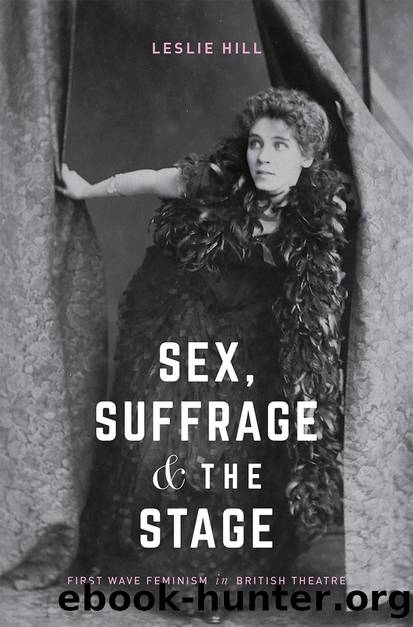Sex, Suffrage and the Stage by Leslie Hill

Author:Leslie Hill
Language: eng
Format: epub
Publisher: Macmillan Education UK
Eugenics
Eugenics, the âscienceâ of improving human stock, was used by conservative and progressive thinkers alike, including dramatists, to further their diverse theories on motherhood in relation to human evolution and to the nation-state. The idea of selective human breeding can be traced back to antiquity, with Plato advocating a state-run programme of procreation to fortify the guardian class in The Republic. The Victorian eugenics movement was founded by Francis Galton (Charles Darwinâs cousin) who coined the term âeugenicsâ, meaning âgood in birthâ, in 1883. Galtonâs goal was to improve the human race through positively encouraging breeding in the âfittestâ members of society while negatively discouraging or preventing breeding among the âweakâ â accelerating natureâs process of selection. Defining the fittest and the weakest members of society was, of course, revealing of class, race and gender prejudices, with the working classes generally described as âundesirableâ along with âthe feeblemindedâ, a popular but vague Victorian term which could mean anything from criminally insane to alcoholic, uneducated or poor. The fittest, of course, were the (white) upper and middle classes. Eugenic theories were considerably energized in 1900 by a rediscovery of Mendelâs laws on biological inheritance, which privileged ânatureâ to the virtual exclusion of ânurtureâ as a causative factor of behaviour and ability. Social and economic conditions such as poverty, illiteracy and prostitution were cast simplistically in Mendelian terms as genetic traits that would be inherited rather than behaviours rooted in social conditions thus eliminating the need to address or reform those social conditions.
A sense of panic among the upper and middle classes about being out-peopled by undesirables became a rationale for the advocacy of state-regulated eugenic policies to prevent an apocalyptic ârace suicideâ (Sprague, 1915, p. 158). Proponents of eugenics attempted to quell social anxieties over a rise in the working-class population, frequently characterized in terms of degeneration and atavism, by proposing a form of race control in which the fittest members of society (upper- and middle-class people like themselves) would become the genetic guardians of British stock. The increasing popularity of evolutionary theory meant that impoverished material living and working conditions could now be dismissed as the result of biological degeneracy, leading to arguments against state support and private philanthropy aimed at helping the poor or infirm as unnaturally perpetuating withered stock.7 As I touched on in the Introduction, race had a broader meaning to Victorians than it does today, as anthropologists classified races by environmental elements like languages and cultures as well as by inherited physical traits like skin tone, conflating heredity and culture. When nineteenth-century authors speak of âthe raceâ in terms of British nationalism and the need to replenish the population, we can infer they are speaking of the white majority, but it does not always follow that they are thinking in terms of ethnicity.8 The slippage between race and culture9 in the era means that notions of perpetuating âthe raceâ arenât exclusive to racial types. The dramatists considered here are much more explicit about class differences in terms of racial âfitnessâ than they are about geographic or ethnic origins.
Download
This site does not store any files on its server. We only index and link to content provided by other sites. Please contact the content providers to delete copyright contents if any and email us, we'll remove relevant links or contents immediately.
Kathy Andrews Collection by Kathy Andrews(11834)
The remains of the day by Kazuo Ishiguro(9000)
Spare by Prince Harry The Duke of Sussex(5197)
Paper Towns by Green John(5191)
The Body: A Guide for Occupants by Bill Bryson(5097)
Industrial Automation from Scratch: A hands-on guide to using sensors, actuators, PLCs, HMIs, and SCADA to automate industrial processes by Olushola Akande(5061)
Machine Learning at Scale with H2O by Gregory Keys | David Whiting(4313)
Be in a Treehouse by Pete Nelson(4051)
Never by Ken Follett(3957)
Harry Potter and the Goblet Of Fire by J.K. Rowling(3858)
Goodbye Paradise(3810)
The Remains of the Day by Kazuo Ishiguro(3413)
Into Thin Air by Jon Krakauer(3399)
Fairy Tale by Stephen King(3399)
The Cellar by Natasha Preston(3344)
The Genius of Japanese Carpentry by Azby Brown(3309)
120 Days of Sodom by Marquis de Sade(3275)
Reminders of Him: A Novel by Colleen Hoover(3121)
Drawing Shortcuts: Developing Quick Drawing Skills Using Today's Technology by Leggitt Jim(3083)
